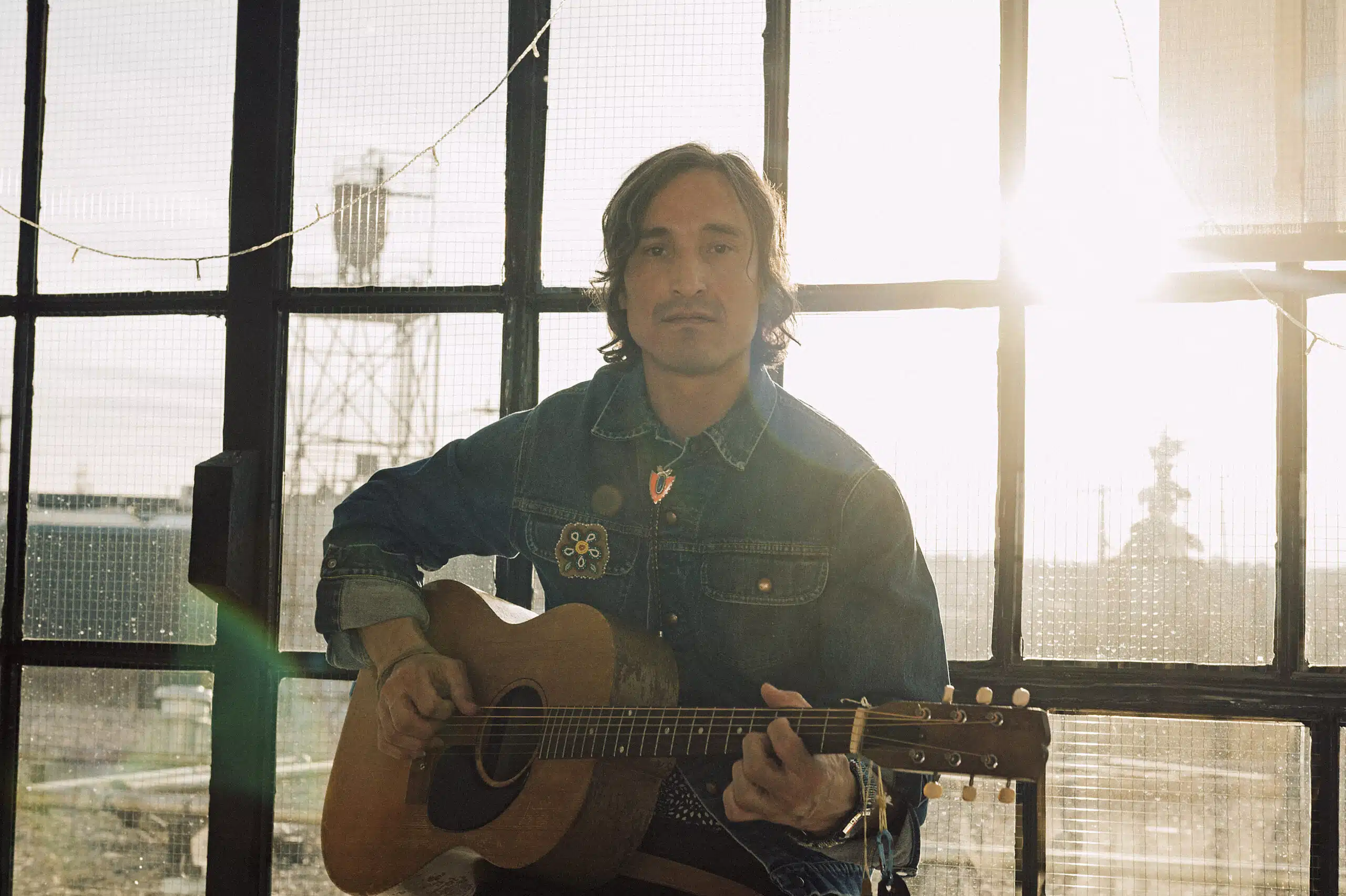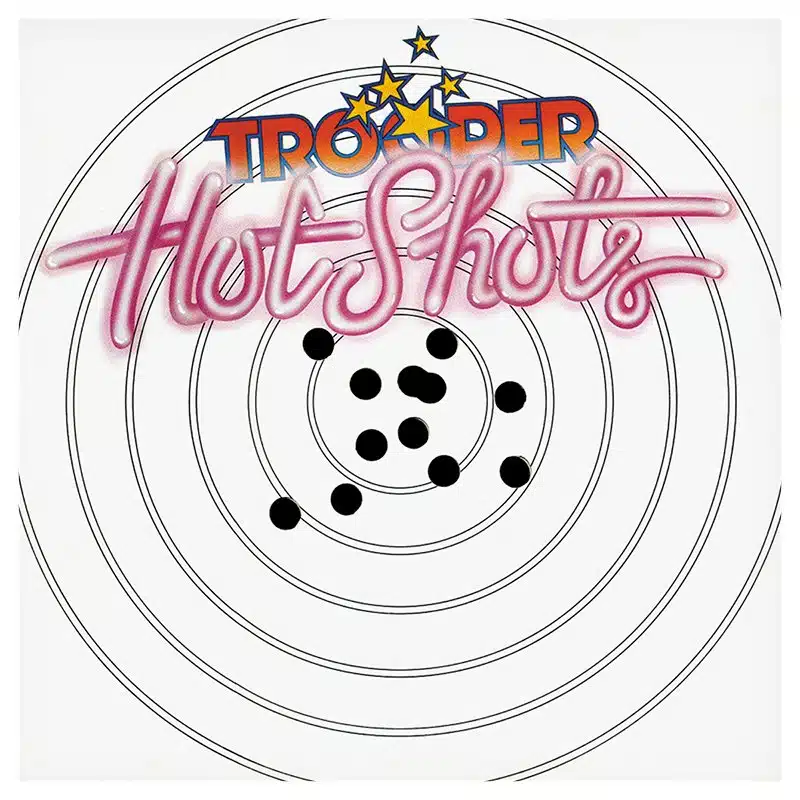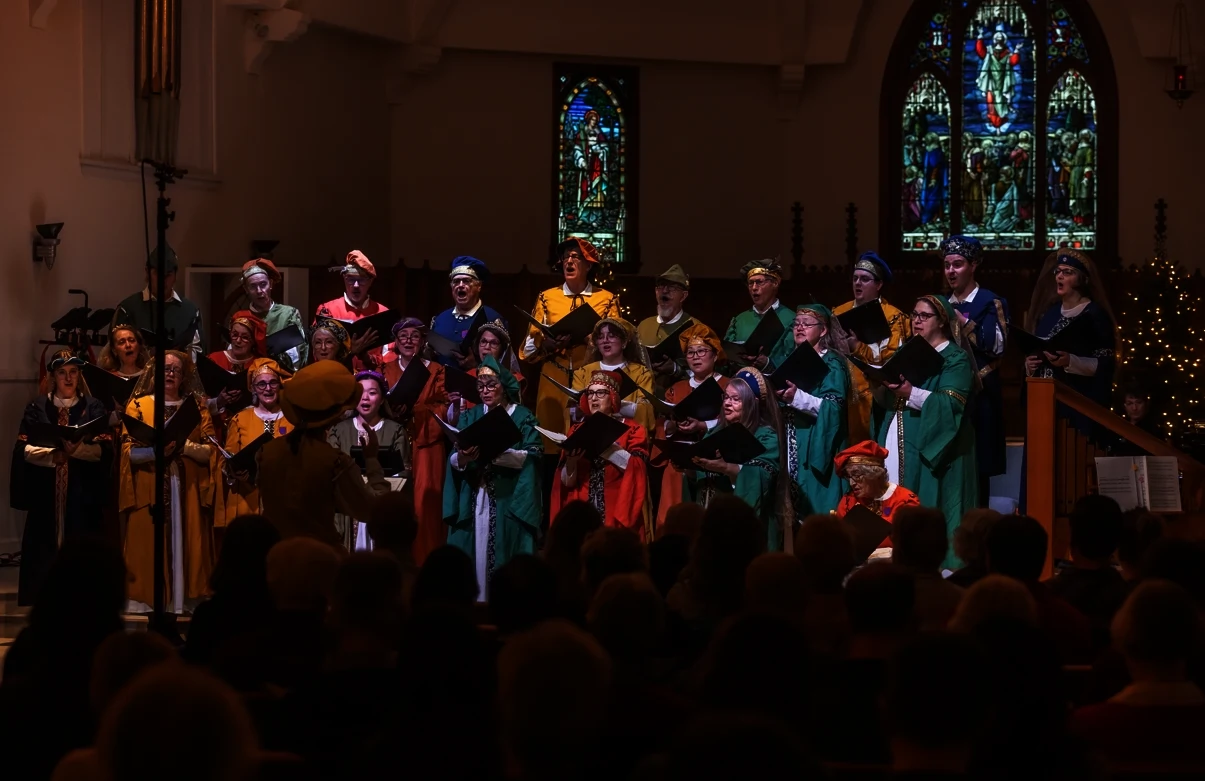A listener could be forgiven for assuming, based on exactly the first minute of Into the Night, track one of Shane Ghostkeeper’s new solo album, Songs For My People, that this might be his most ambitious, esoteric and experimental work yet.
The haunting, clicking, droning sounds cut with a low rumbling of vocal intonations brings to mind a drive through the woods of northern Alberta. Sitting low in the passenger seat, watching the light flickering through the passing trees like the film of a Super 8 camera.
And then suddenly, our storyteller cuts in with a twang, and we’re off — on what really is, in its own way, Ghostkeeper’s most ambitious, esoteric, experimental, and, in his words, “normal” work yet.
“I have my family up north, in the surrounding communities of Paddle Prairie Métis Settlement, High Level, Rocky Lane, and even as far away as Fort Vermillion,” he says. “It’s where I was raised, and I grew up with a country music-loving family, and the odd classic rocker. So this just became an exploration of all the music I was raised on, as a way to honour my people up north — as a gift, I suppose.
“I spent most of my career making experimental pop, folk-rock stuff, so it’s been a long time coming. Basically my family’s been waiting for me to write something ‘normal’ — traditional music.”
The easy associations here are Johnny Cash, Lou Reed, even a hint of Leonard Cohen. But Ghostkeeper says the influences run much deeper.
“I’ll always cherish all the old time country — the really older stuff like Hank Williams Jr. that my grandpa was always listening to. I used to spend so much time with my grandpa out on the farm during the summer holidays and on weekends, and then also with my grandma, and she’d always be listening to, or teaching me, or playing on the piano — gospel songs, country gospel. So it’s pretty well-steeped in those melodies and styles.
“And then, as I got older, with my dad and my mom, and with the ’70s stuff, you know, Tanya Tucker and Conway Twitty, Waylon Jennings. So I was just really immersed in that earlier classic country stuff.”
Songs for My People is, at its heart, a way to process profound loss. The songs’ upbeat, cheerful, honky-tonk melodies betray themes of hopeless romanticism, grief, and existential uncertainty manifesting as physical burden.
In this way, Ghostkeeper really is a keeper of ghosts; a storyteller, a preservationist tasked with honouring those gone before — and those who remain.
“Definitely Sunbeam is more of a very recent sentiment — it was written for my uncle who passed away from cancer a couple years ago, during COVID. And that was definitely, totally, exactly a way for me to get through that, and also, I guess, reconcile the fact that I couldn’t make it up to the funeral during COVID. So it’s kind of like a gift for my auntie, who remains.
“In place of me being there at the funeral, where usually I am the guy that sings a couple of songs, playing guitar at the Catholic church — the Ghostkeepers, the elders are all Catholics — I’m usually the funeral singer, and I couldn’t make it, so that song came out instead, as a gift to her.”
The album’s toe-tapping first single, Hunger Strike, is a southern gothic love story that could have just as easily sprung from the mind of William Faulkner or Carson McCullers, when it is in fact, a true story about Ghostkeeper’s grandparents.
“To start with, my grandma and my grandpa were both legendary dancers. They showed up at every do and wedding, and danced all night long with such stamina beyond everyone else. And they were very showy and very fancy about it, and they both loved it. They were a very sweet couple that way, and romantic. So the couple of songs that are dedicated to them, and their relationship specifically, are meant to be good dance songs — which was an important agenda for me, to honour them.
“And Hunger Strike, specifically, is about my grandpa’s passing. My grandma passed before he did, just barely a few years before he did. They had lived an entire life together, built their home together out on the farm. Basically they were homesteaders.
“When she passed away, he was just so heartbroken. It was just killing him. And he was turning into a real self-proclaimed grouch, and he was just getting miserable. He was well aware of it — he often spoke about it, and vented about it — that he was lonesome and tired of it.
“And so, one day, a few years after her passing, he called us all up, he called me, and said he’d had enough, that he was done. He was going to stop eating and stop drinking, and was going on a hunger strike until he passed away. I think he lasted about a week like that, or so.
“I was able to make it up north, my first son was able to meet him, he was only about a year, I guess. Everyone was able to make it up to see him. He lasted about a week on his hunger strike. And then in the hospital, his family by his side, he took his last breath. And that’s when my mom told me that afternoon, that day was his and my grandma’s wedding anniversary.
“I was floored. The immense love and romance that my grandpa was able to show in his last days and his last breath was very incredible. I just had to share that with the world and honour that as best I could. Because it’s a story that will be passed down in my family for generations I imagine.”
Although grief figures prominently throughout Songs For My People, the stories of those still living aren’t overlooked. Ghostkeeper honours his wife, artist and Ghostkeeper bandmate, Sarah Houle, with the song he used to propose to her, One More Name.
Meanwhile, V Chill is a letter written from a father to a son — in this case, the couple’s eldest son, Vittal — about what it means to be a good person, to live a meaningful life, to give of oneself without conceding one’s internal strength, and without prospect of reward.
“Dedication to family is something that’s been instilled in me for as long as I can remember, and I just try and carry that forward and on with Sarah and my two sons. So far it’s been special, and an honour to be a father, and Sarah’s partner, and it’s always been, every day. We were raised by a really strong, tight-knit, Métis community up north, and that’s what this record is all about — honouring that. Honouring my childhood, honouring the people I’m surrounded by who are huge factors in my strength, in my pride, in my spirituality, I suppose.
“There’s some strength and pride, and some real-life, modern success stories, I’d say. Obviously not in terms of finances, or accolades, or awards, or anything like that, but just a modern, Métis, romantic family success story.”
So why now? Why was this the right time to step back from Ghostkeeper the band, and to metamorphosize into Shane Ghostkeeper, the honky-tonk singer-songwriter?
“I’ve been wanting to do this for a while for my family. And they have been waiting a long time — and especially now so much. We’re starting to lose our elders, so it was really pressing time to get something sweet out, you know? And something that isn’t experimental, something where I didn’t have to be trying so hard to make interesting, unpredictable, experimental music, and making social commentary statements.
“I didn’t labour over weird time signatures, or really hard, complicated guitar riffs. I just strummed chords, used normal sounding chords in the vein of country music as the backdrop, and just focused on storytelling and trying to be sweet and fun and light as a way to help channel the grief and loss, and to glorify and romanticize the people that I was so fortunate to be raised by.”
Ghostkeeper says one main ideological difference between his solo work Songs For My People and Ghostkeeper the band’s creative output is the conscious choice he made not to make Indigenous activism his lodestar, and instead focus on the importance of normalizing the image of thriving Indigenous families. To honour them, he says, in a more human way — something that is often lost in discussions of decolonization and reconciliation.
“What I tried to do specifically in this one, to set it apart from the Ghostkeeper stuff, is trying to leave the greater politics out of it — in terms of activism, I mean. And then just get down to the core of my familial relationships.

“Sarah and I have been doing this activism through song thing for a while now, we’re on our fifth record now or something, and now that it’s such a big thing — truth and reconciliation, and Indigenous issues being at the forefront — it definitely felt time for me to just set that aside for a bit because it’s happening enough, there’s enough artists out there on that agenda, and on that road right now, which is great. It’s awesome that people are finding strength to go down that road.
“But we’ve been there a bunch, and now just feels like the right time to show the world that I come from very strong, very proud and determined and resilient people. That’s how Sarah and I made it down here and got into music in the first place; we were fortunate enough to be raised by very strong, healthy, Cree-Métis people. It’s important for me to share that with the world.
“The whole political environment around Indigenous issues set a huge fire under me to just sit back. Multidimensional Culture (Ghostkeeper’s 2022 album) definitely had a lot of social commentary and sarcasm and cheekiness and humour. And so it was important for me, for my own spiritual, artistic journey, to just sit back and be sweet, and to honour my family. To not so much be a warrior, or an activist warrior. I think my soul was just really needing to take it easy and to be sweet.”
Ghostkeeper says Songs For My People is a celebration for him, and for his family. And the lightness of the songs was intentional. He wanted to make a record his beloved grandparents could have danced to — as such, the equally endearing videos for both singles, Hunger Strike and I Know How heavily feature dance.
But much like the album’s opening minute, Ghostkeeper consciously chose to close out Songs For My People on a surprisingly sombre, but reverent note, with a cover of Just a Closer Walk With Thee, a song with its origins rooted in southern gospel, and which later came to be covered dozens of times, particularly by country artists, many of whom were direct influences.
“That seems to be the most popular country gospel for everyone up north — especially my grandma. So that’s kind of like an ode to my grandmother. One last performance of that song for her. I’ve had to sing it a number of times at funerals throughout my days, since I first started playing when I was a teenager. The melody is just so strong. I’m so grateful to be exposed to those country gospel melodies. They’re so haunting.”
Ghostkeeper says despite coming from a predominantly Catholic background, he was given the freedom to choose his own direction and beliefs from an early age.
“When it was time for me to join my cousins in the Catholic church to do confirmation — the process you have to go through in order to drink the wine and eat the bread — well, I was always more drawn to the Indigenous spiritual practices and ceremonies. I was lucky enough to be surrounded by that as well. And that was the path I always felt was right for me. I always felt strong connections to the land up north; my power spots were up there.”
For Ghostkeeper, his family’s farm — the homestead his grandparents built in Rocky Lane — is where he draws the most strength.
“When I was a little kid, I just loved it, I was attracted to it, I felt connected to creation. To the creator, I suppose, if you want to call it that. I don’t know if I can really describe it in religious terms, but it’s just the place I always felt connected. Connected to the universe, to creation. I didn’t feel like I was without. I didn’t feel afraid of death or uncertainty. Those places nourished me that way, and my soul, in a way that I didn’t need a bunch of rules, didn’t need to follow a bunch of rules in a book from a colonial institution. And that’s something that I’ll always feel. I hate to use the word ‘pride’ — maybe not pride, maybe fortunate, and grateful for those power spots. And that’s why I call them power spots, because they gave me strength to not need religion, or to be searching for something that I was without. That’s why I call them my power spots, because they never left me without anything.”
And as for his grandparents themselves, his aunts and uncles gone before, who he also drew power from, and by whom he was nurtured and loved? What would they think of Songs For My People?
“I think they’d get a good chuckle. I think they’d think it was pretty outrageous that I get to do this for a living. I think it’d put a real big smile on all their faces.”
Songs For My People will be released by Victory Pool Music on July 28. Catch Ghostkeeper the band at this year’s Calgary Folk Music Festival on Prince’s Island Park July 29 and 30.



